Our Services

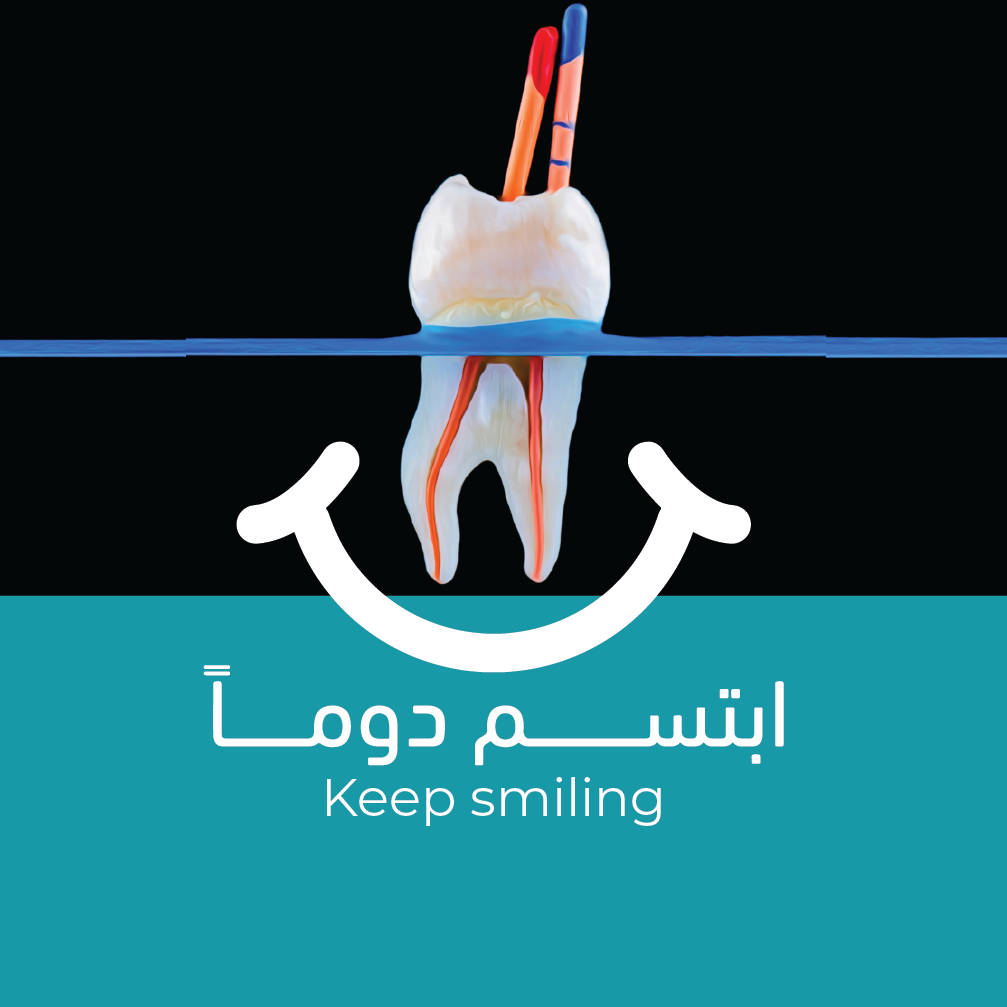
Root canal treatment
What is endodontic treatment
Endodontic treatment, or “root canal treatment” : is a medical procedure aimed at saving damaged teeth by removing infected or inflamed tissue inside the root canal, this treatment is done when the pulp (soft tissue inside the tooth) is damaged due to deep caries, injuries, or infection.
What is a microscope in the treatment of dental roots
The surgical microscope is an advanced tool used to improve the accuracy of treatment in the field of Endodontics.
The microscope provides an enlarged and illuminated view of the treatment area, which helps doctors to:
- See the fine details:
The doctor can see the root canals with a higher resolution, including small and complex ones that may be invisible to the naked eye.
- Improved cleaning and disinfection:
The microscope allows the doctor to more effectively remove all contaminated tissues and bacteria.
- Identification of cracks and crevices:
The microscope helps to detect any cracks or fissures in the tooth that may affect the success of the treatment.
Stages of treatment of dental roots using a microscope:
1. Diagnosis and planning:
- The doctor begins by assessing the condition of the tooth through a clinical examination and X-ray images. If necessary, a microscope is used to obtain accurate details about the condition.
2. Anesthesia:
- Local anesthesia is used to anesthetize the tooth and surrounding tissues, which makes the procedure painless.
3. Open the tooth:
- The doctor makes a small incision in the upper part of the tooth to access the root canals. A microscope is used to improve the visibility of the channels inside the tooth.
4. Removal of infected tissue:
- Dead or infected pulp is removed from the root canals using precision instruments. The microscope helps to ensure the removal of all damaged tissue.
5. Cleaning and sterilization of channels:
- The channels are cleaned and disinfected by special means to ensure the removal of all bacteria and contaminated substances. Enlarged vision contributes to better hygiene.
6. Filling channels:
- After cleaning, the channels are filled with a specialized closing material (such as gutta-percha) to prevent re-infection and protect the tooth.
7. Reconstruction of the tooth:
- After treatment, the tooth may need a permanent filling or crown to provide the necessary strength for normal function.
Frequently asked questions about endodontic treatment using a microscope:
1. Is the treatment of dental roots using a microscope more effective
- Yes, the use of a microscope can increase the accuracy and success of treatment, especially in complex cases.
2. What are the benefits of using a microscope compared to traditional methods
- The microscope provides an enlarged and detailed view, which improves the accuracy of removal of diseased tissues and cleaning of ducts, reduces the likelihood of errors.
3. Are there any risks or side effects of using a microscope
- The use of a microscope is generally safe and is considered a useful addition. Some patients may experience some minor discomfort after the procedure, but it usually goes away quickly.
4. How long does it take to treat dental roots using a microscope
- The duration of treatment depends on the complexity of the case, but usually it takes from one to two hours.
5. Can I return to normal activities after treatment
- Yes, you can resume normal activities after treatment, but it is better to avoid solid foods and hot drinks for a few days to avoid any discomfort.
If you have dental problems or need root treatment, the use of a microscope can be an excellent option to ensure the best possible result. Consult a specialist dentist to determine the optimal option for your case.
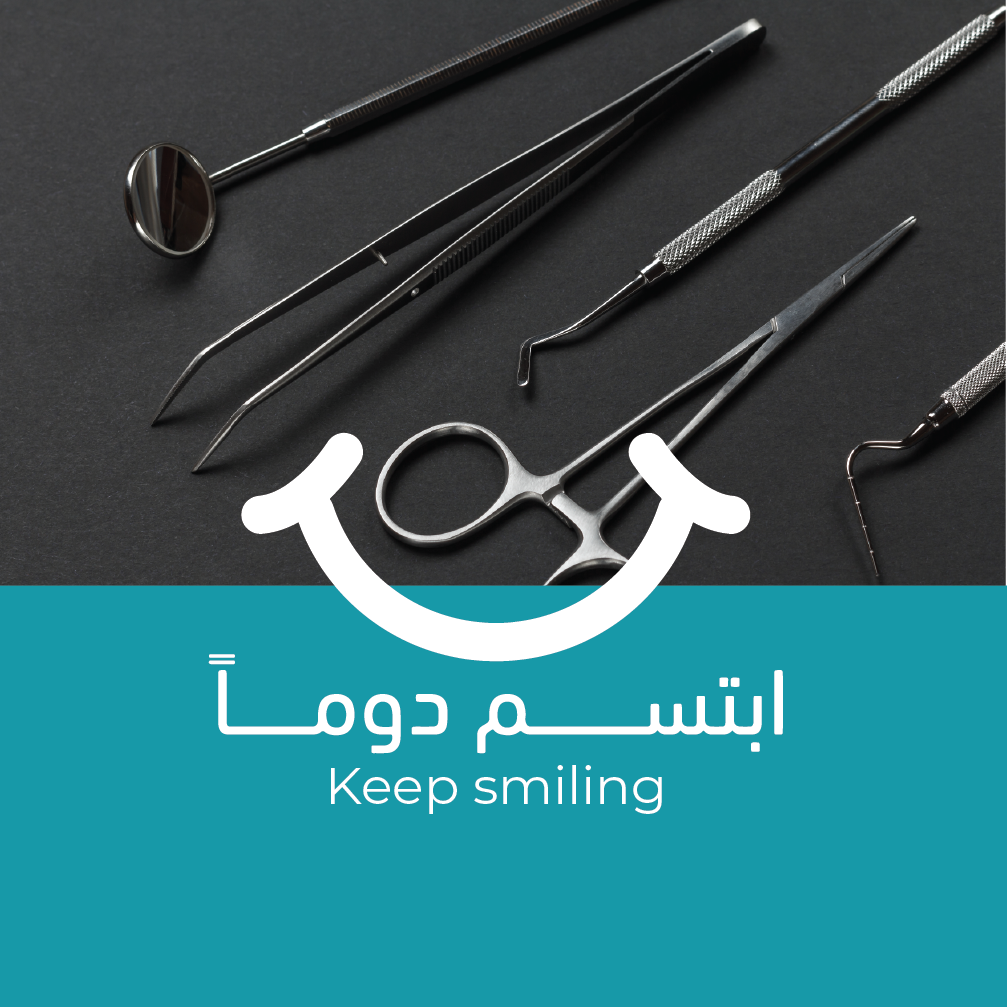
General dentistry
General Dentistry: your comprehensive guide to maintaining your oral health and smile
General Dentistry is the basis in oral and dental health care, it is not limited only to cleaning teeth or treating caries, it includes a wide range of preventive and therapeutic services that preserve oral health and protect it from future problems. In this article, we will review the importance of General Dentistry and the services it provides, as well as tips for maintaining oral health and a perfect smile.
What is general dentistry
General Dentistry is the basic branch of Dentistry aimed at the prevention, diagnosis, and treatment of oral and dental problems. The general dentist plays an important role in maintaining oral health by providing regular care that includes cleaning, regular check-ups, and emergency treatment.
Services provided by the general dentist
Periodic examinations and diagnosis of problems:
The dentist examines the mouth and teeth to detect any early problems such as caries, gum infections, or bite problems.
Professional dental cleaning:
Remove calcareous deposits that cannot be eliminated with regular brushing to prevent caries and gum disease.
Treatment of caries and dental fillings:
Treatment of dental cavities using cosmetic fillings to restore the function and appearance of teeth.
Treatment of periodontal disease:
These include deep tartar removal and treatment of gum infections to prevent tooth loss.
Tooth extraction and emergency treatment:
In some cases, it may be necessary to extract the affected tooth or treat emergency conditions such as severe pain or inflammation.
Teeth whitening and cosmetic treatments:
The general dentist offers teeth whitening services and other cosmetic procedures to improve the appearance of a smile.
The importance of periodic visits to the dentist
Early detection of problems:
Prevents the aggravation of simple dental problems into complex cases that require expensive treatments.
Maintaining general oral health:
Reduces the risk of gum disease and tooth decay.
Promote overall body health:
Oral health is associated with heart disease, diabetes and other health conditions. Improve appearance and self-confidence:
Having a healthy and beautiful smile positively reflects on self-confidence.
Tips for maintaining oral and dental health
Brushing teeth twice a day:
Using a paste containing fluoride.
Use dental floss daily:
To clean the areas where the brush does not reach.
Limit the intake of sugars and carbonated drinks:
To prevent caries.
Quitting smoking:
It increases the risk of gum disease and oral cancer.
زيارة visit the dentist every 6 months:
To conduct examinations and professional cleaning.
General Dentistry is an essential element of oral health care, as it helps in preventing and treating dental problems before they worsen. Adherence to good hygienic habits and regular visits to the dentist guarantee you a radiant smile and perfect oral health. Feel free to book your appointment today to keep your teeth healthy
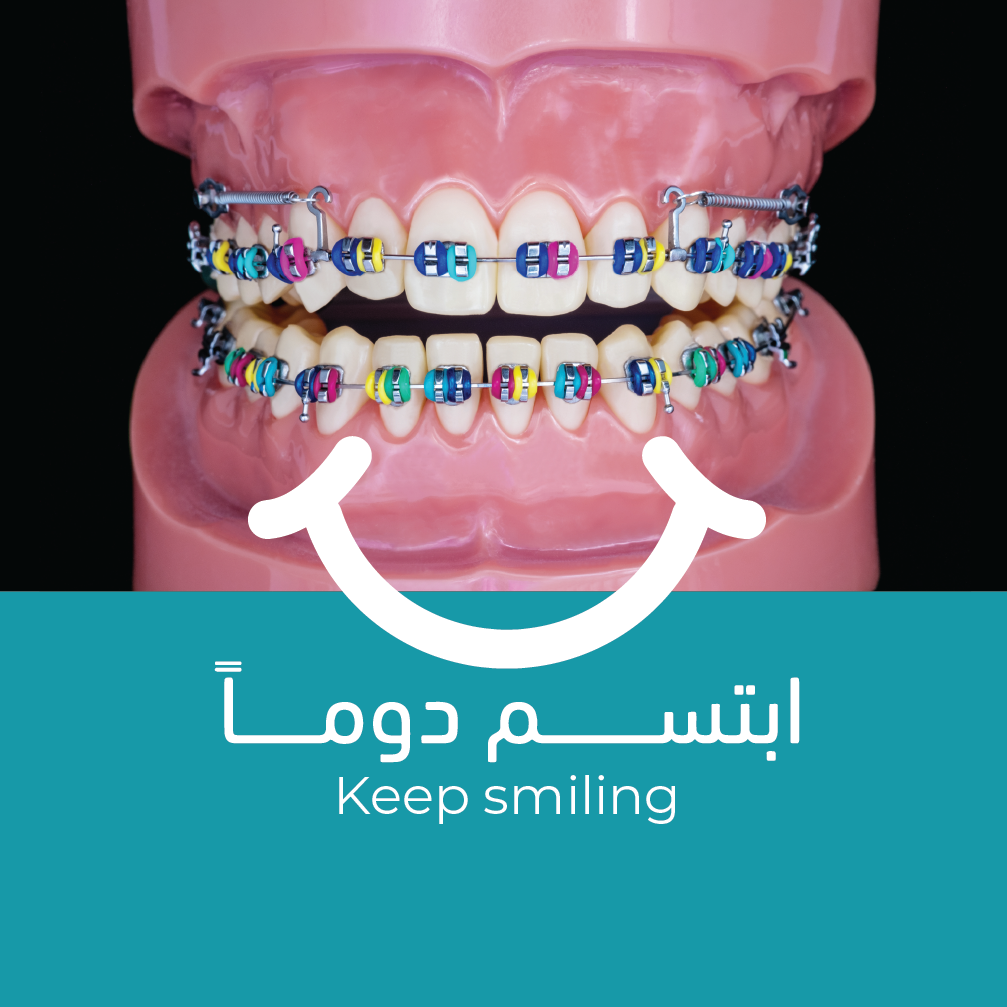
Orthodontic Braces
What is calendar transparent templates
Transparent braces: it is a modern orthodontic system that uses transparent and customized molds to correct dental problems without the need for traditional metal braces. These molds are designed using three-dimensional technology to accurately fit the shape of the teeth and jaw, providing an aesthetic and effective solution to improve the symmetry and arrangement of the teeth.
How does the calendar of transparent templates work
1. Assessment and planning:
- Treatment begins with a visit to the dentist or orthodontist, where a thorough examination of the teeth and jaw is carried out. X-ray images and three-dimensional copies of the teeth are taken.
2. Design of templates:
- Based on the data collected, computing technology is used to design a series of transparent templates. Each mold represents a stage of treatment.
3. Installation and switching:
- Molds are made using transparent and comfortable materials, they are worn on the teeth. The casts should be switched periodically according to the schedule established by the doctor to ensure progress in treatment.
4. Follow-up:
- During the treatment period, the doctor monitors the progress of the case and, if necessary, adjusts the treatment plan to ensure the achievement of the desired results.
Benefits of rectifying transparent molds:
- High aesthetic: the molds are almost transparent, which makes them a favorite option for adults and young people who prefer invisible braces.
- Better comfort: the molds are specially designed to be comfortable, and do not contain wires or brackets that may cause discomfort.
- Remove molds: molds can be removed when eating or brushing teeth, making it easier to maintain good oral hygiene.
- Effective results: transparent braces can correct most minor to moderate dental problems, including spacing, deviation, and crowding.
Frequently asked questions about the calendar of transparent templates :
1. How long does the treatment with transparent molds take
- Answer: treatment usually takes from 6 to 18 months, depending on the complexity of the case. The doctor will determine the schedule based on your individual needs.
2. Is the treatment of transparent molds painful
- Answer: patients may feel some slight discomfort or pressure after wearing each new mold, but this pain is usually minor and temporary.
3. Is it possible to eat while using molds
- Answer: yes, the molds should be removed before eating or drinking, and then put back on after brushing teeth. This allows eating all kinds of food without restrictions.
4. How long is the Daily wearing of casts
- Answer: for best results, the molds should be worn for 20 to 22 hours a day. They are removed only when eating and brushing teeth.
5. Can transparent templates be used for complex cases
- Answer: transparent mold straightening is effective in most simple to medium cases, but it may not be suitable for some complex cases. In such cases, the doctor may suggest other options.
6. How to care for molds
- Answer: the molds should be cleaned regularly using warm water and a soft brush. Special mold cleaners can be used to make sure the molds are kept clean and bacteria do not accumulate.
If you are considering orthodontic transparent molds, consult your dentist or a qualified orthodontist to determine if this system is the most suitable for your case. Transparent template braces can be an excellent option to improve the beauty and health of your smile in a comfortable and aesthetic way.
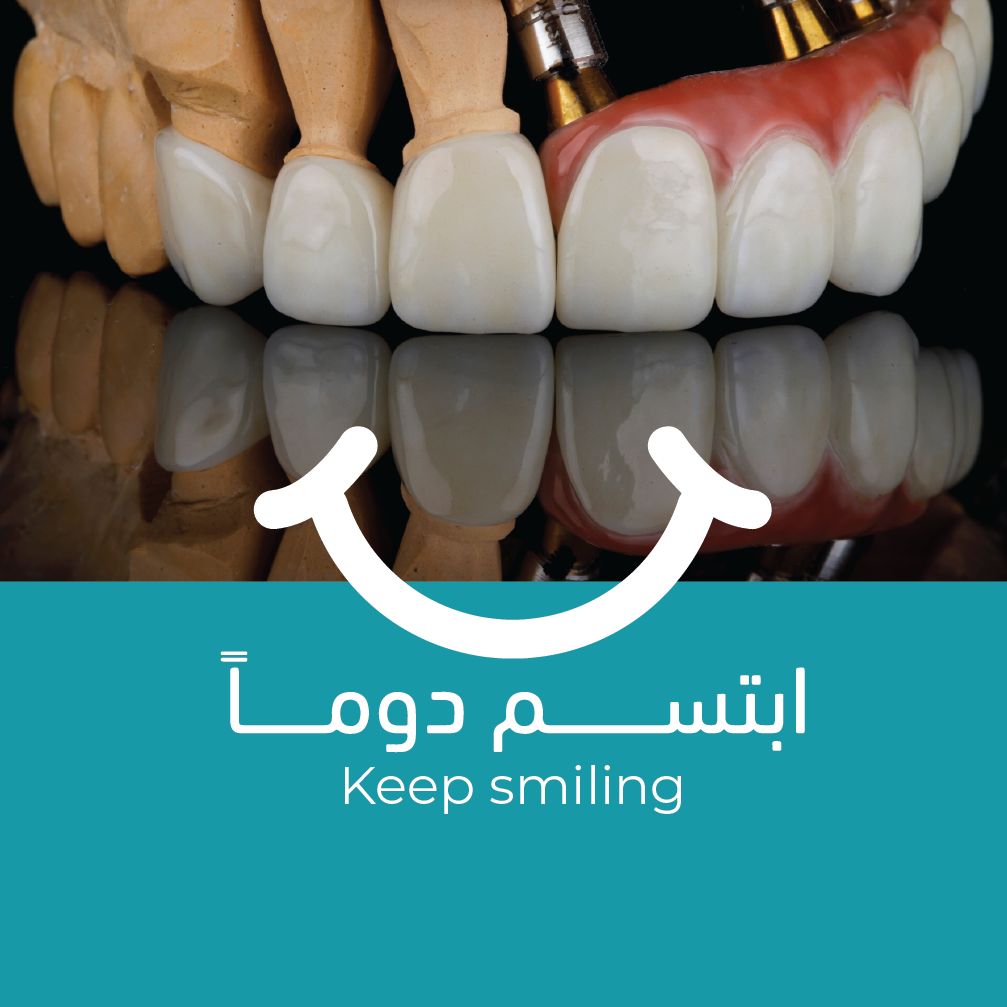
Dental implants
Instant Dental Implants : the ideal solution for a permanent smile in record time
Have you ever dreamed of getting your smile back in one day With instant Dental Implants, you no longer have to wait for months to get new teeth. This advanced technology provides a quick and effective solution to replace missing teeth in just one session, giving you instant comfort and confidence.
What is immediate dental implantation
Immediate dental implantation is a modern technique in which implants are implanted into the jawbone immediately after the extraction of the damaged tooth, without the need for a long waiting period for the bone to heal. In some cases, a temporary crown can be installed in the same session, allowing the patient to immediately enjoy the appearance and function of the new tooth.
The difference between immediate and conventional dental implants
| The standard | Immediate dental implants | Traditional dental implants |
|---|---|---|
| Duration of treatment | It is carried out in one session or within a few days | It takes several months |
| The need to wait for bone healing | There is no long waiting time | The patient needs a recovery period of up to 6 months |
| Convenience and instant functionality | Yes, the tooth can be used immediately | The patient needs time before the installation of a permanent tooth |
| Success rate | Very high when choosing the right case | Also high but need longer patience |
Advantages of instant Dental Implants
Immediate results:
The patient can leave the clinic with new teeth on the same day.
Reduce the number of Sessions:
Compared to traditional agriculture, which requires several visits.
Better preservation of gum tissue and Jawbone:
Where bone loss is reduced as a result of tooth loss.
Quickly restore self-confidence:
No need to wait for months before enjoying a new smile.
Safe and effective procedure:
It is carried out using the latest medical technologies to ensure the best results.
Suitable cases for immediate dental implants
Although this technique suits many patients, it is not ideal for everyone. Cases that can benefit from immediate implantation include:
- Patients with sufficient bone density in the jaw.
- People who are non-smokers or who smoke less.
- Patients who do not have diseases that affect bone healing, such as uncontrolled diabetes.
How is the process of immediate dental implantation
Initial assessment:
The dentist conducts a comprehensive examination and three-dimensional radiography to assess the condition of the jaw and bone.
Tooth extraction (if necessary):
The damaged tooth is carefully removed without damage to the surrounding bone.
Implant placement:
The metal implant made of titanium is inserted directly into the bone.
Installation of the temporary crown:
In some cases, a temporary tooth can be installed that will give an immediate appearance and function.
Follow-up and recovery:
After several months, the temporary crown is replaced with a permanent crown to ensure the best appearance and function of the teeth.
Post-transplant: care and follow-up
- Avoid solid foods in the first days after the operation.
- Maintain oral hygiene by using brushes and dental floss.
- Commit to follow-up visits with the dentist to ensure successful healing of the implant.
- Refrain from smoking to improve the chances of success of the operation.
Is immediate dental implantation painful
This operation is performed under local anesthesia, so it is painless. After surgery, the patient may feel some swelling or slight discomfort, but it gradually disappears within a few days using painkillers prescribed by the doctor.
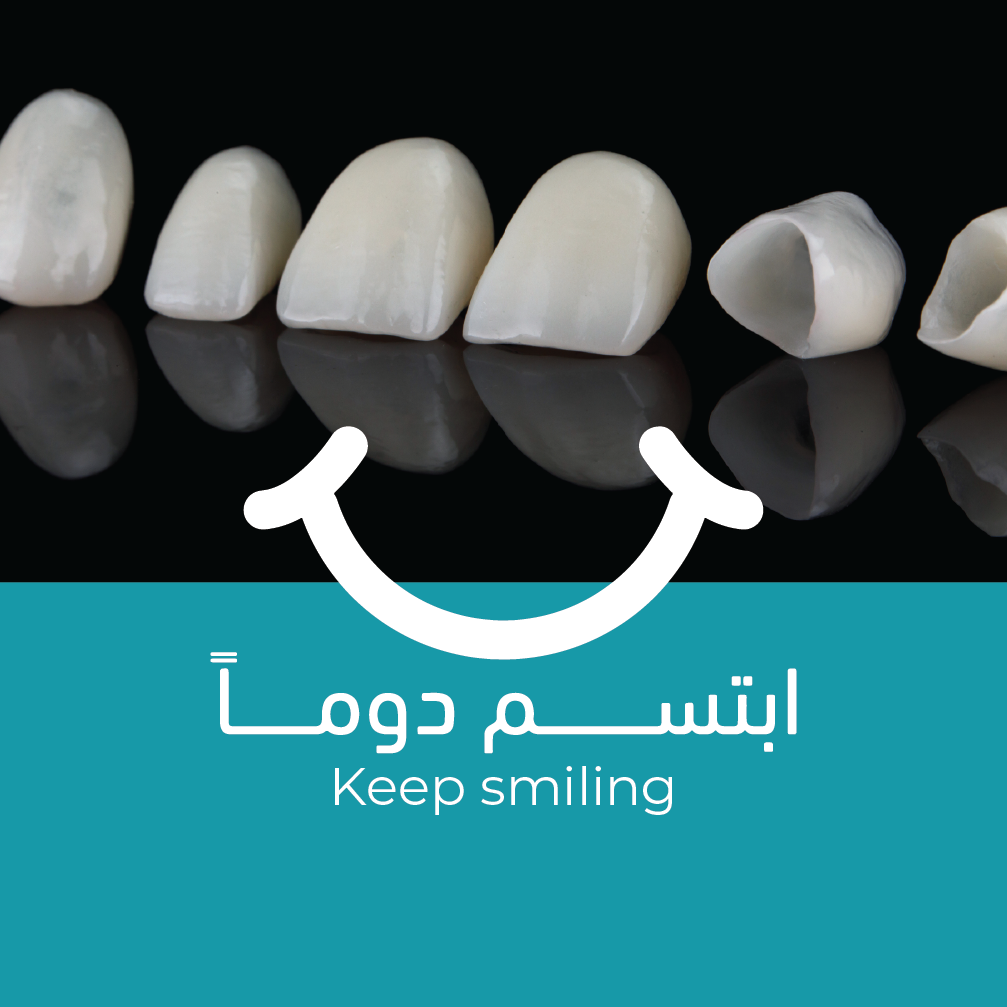
Dental fixtures
What are feldspathic lenses
Feldspathic lenses are an advanced type of cosmetic lenses that are made of natural porcelain material, which makes them the ideal choice to improve the appearance of teeth attractively and naturally. These lenses are distinguished by their light weight and durability, as well as their ability to simulate the natural shape and color of teeth.
Features of feldspathic lenses:
Natural appearance:
It gives the teeth a shine and a shape that is very close to the original teeth.
Preservation of original teeth:
It requires a simple preparation of the teeth, which means the preservation of most of the enamel layer.
Stain resistant:
Thanks to the porcelain material, the lenses remain resistant to pigmentation caused by beverages such as coffee and tea.
Long lifespan:
With proper care, it can last for many years without losing its quality.
When do you need feldspathic lenses
You can consider feldspathic lenses if you suffer from:
- Spaces between the teeth.
- Pigmentation does not go away with bleaching.
- Teeth wear out or their tips break.
- Asymmetry of tooth size or shape.
How to install feldspathic lenses
Initial consultation:
It starts with a dental examination and an assessment of their condition by a specialist cosmetologist.
Preparation:
A very thin layer of enamel is removed (in some cases there is no need to prepare teeth).
Lens design:
The lenses are precisely designed to fit the shape of your teeth and smile using advanced technologies.
Installation:
The lenses are fixed using durable adhesives, which ensures that they stay in place.
Care after installation of feldspathic lenses:
- Avoid biting hard objects such as ice or pens.
- Maintain dental hygiene by brushing and flossing daily.
- Regularly visit the dentist for examination and cleaning.
Why choose the AlSondos complex for feldspathic lenses
At the AlSondos dental complex, we offer you:
- A team of elite specialized cosmetic dentists.
- The latest technology to ensure accurate and natural results.
- Personal consultations to design a smile that suits your facial features and lifestyle.
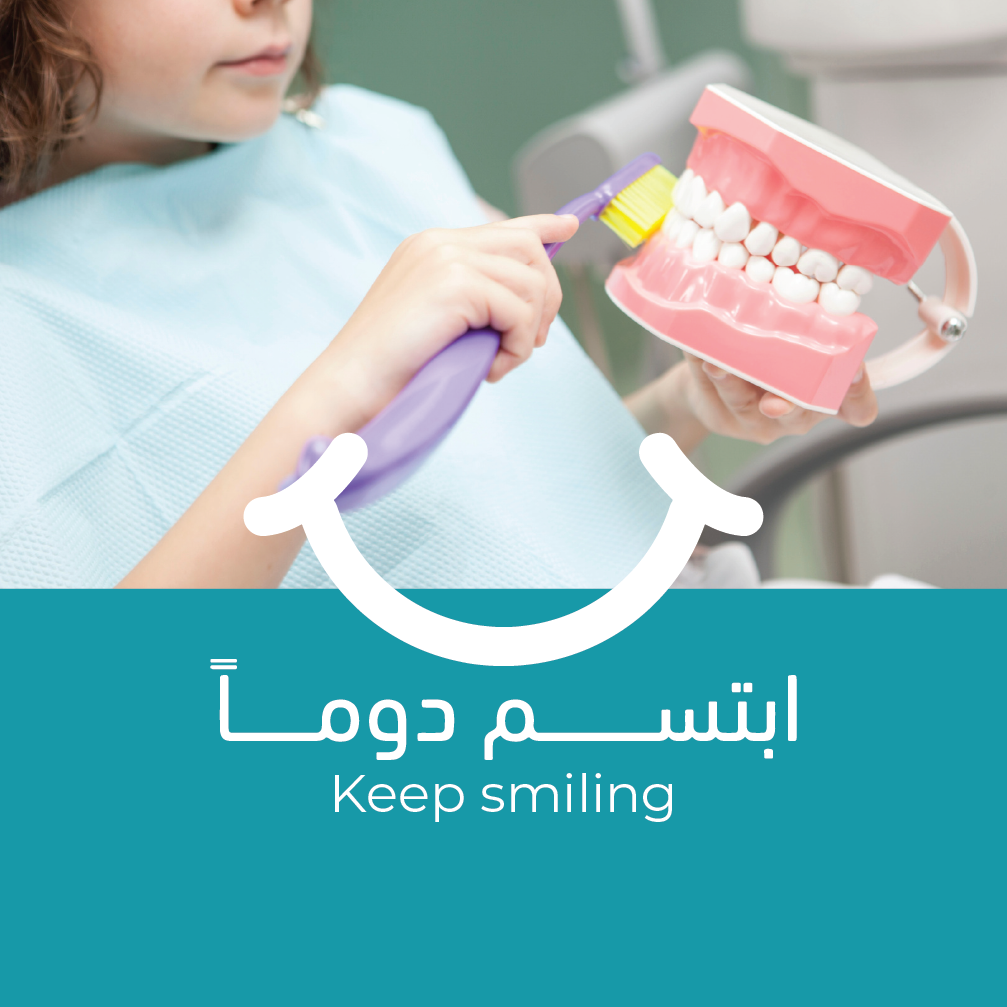
Pediatric dentistry
Pediatric Dentistry: early care to protect the future smile
Pediatric Dentistry is a specialized branch that focuses on caring for children's teeth from early childhood to adolescence. This specialty is characterized by providing preventive and therapeutic care to ensure proper tooth growth and protect them from caries and other problems. In this article, we will learn about the importance of Pediatric Dentistry, the services it provides, and the best tips for maintaining the oral health of the little ones.
What is Pediatric Dentistry
Pediatric Dentistry is a field that cares about the oral and dental health of children, as it focuses on the diagnosis, treatment and Prevention of dental problems that may affect the growth of permanent teeth. Pediatric dentists have special experience in dealing with children in a comfortable and gentle way that makes their visits to the clinic a positive experience.
Services provided by a pediatric dentist
Periodic examinations and tooth growth:
Follow-up the growth of milk and permanent teeth to ensure their healthy development.
Prevention of caries:
Apply fluoride and caries inhibitors to protect teeth from premature wear.
Treatment of dental caries in children:
The use of cosmetic fillings and root treatments to preserve milk teeth until their natural fall.
Treatment of occlusion and bite problems:
Evaluate and treat occlusal problems such as open bite or deep bite that may affect the growth of the jaw and teeth.
Teaching children and parents oral care:
Provide tips on proper teeth cleaning and the importance of proper nutrition for oral health.
The importance of children's dental care
Prevention of caries: avoid pain and infection that may affect the child's overall health.
Ensuring proper growth of permanent teeth: early care helps to avoid the need for braces later.
Teaching early healthy habits: promoting good oral care behaviors from a young age.
Improve the child's experience with the dentist: make clinic visits a comfortable and positive experience.
Tips for maintaining children's dental health
Brushing teeth twice a day: with a fluoride-containing paste and with a soft brush.
Reduce the consumption of sugars: especially sweets and carbonated drinks.
Encourage the use of dental floss: as soon as adjacent teeth appear.
Visit the dentist regularly: every 6 months for a dental examination and preventive cleaning.
Avoid bad habits: such as sucking a finger or using a pacifier for long periods.
Pediatric Dentistry is an essential part of public health care, as it contributes to building a healthy foundation for children's teeth for life. With regular examinations and preventive care, a bright and healthy smile of your baby can be guaranteed. Do not hesitate to book an appointment for your child today to ensure his oral health and the safety of his future teeth
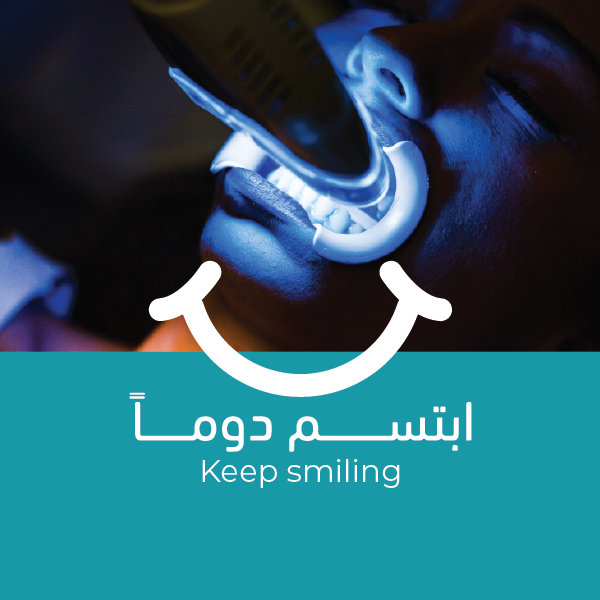
Dental laser
Laser dentistry: a modern revolution in oral and dental health care
Laser dentistry has been undergoing amazing development in recent years, as the laser has become an effective tool in treating many dental and gum problems without the need for painful traditional procedures. This technique is based on directing laser beams with high accuracy to target the affected tissues, which allows more comfortable and fast treatment of patients. In this article, we will review the most important uses of lasers in dentistry, its benefits, and how it can help improve the dental treatment experience.
What is a dental laser
Laser dentistry is an advanced technology based on the use of laser beams in the treatment of teeth and gums with high accuracy. The laser is characterized by its ability to cut or vaporize tissues in a precise way without the need for conventional surgical instruments, which reduces pain and speeds up the healing process.
Uses of lasers in dentistry
- Treatment of periodontal disease: the laser helps to remove the affected tissue without the need for surgical intervention, which reduces bleeding and promotes gum healing.
- Caries treatment: laser can be used to remove caries with high precision and prepare the tooth for filling without the need for conventional drilling.
- Teeth whitening: laser is used to activate whitening substances, which helps in lightening teeth color more quickly and efficiently.
- Treatment of tooth sensitivity: the laser closes the microscopic channels in the teeth, reducing the feeling of sensitivity to cold or hot foods and drinks.
- Cosmetic gum surgery procedure: the laser helps reshape the gums and remove excess tissue for a more even and attractive appearance.
- Treatment of mouth ulcers and herpes: laser can be used to relieve pain and accelerate the healing of oral ulcers and herpes.
The benefits of a dental laser compared to traditional methods
- Reduce pain and discomfort: it reduces the need for anesthesia in many procedures.
- Reduce bleeding and swelling: because the laser closes the blood vessels during treatment.
- High accuracy of treatment: allows to target only the affected tissue without affecting healthy tissue.
- Faster recovery: reduces recovery time compared to traditional procedures.
- Reduce the need for surgical instruments: making treatment more comfortable for patients.
Is a dental laser right for you
The dental laser is an ideal option for patients who are looking for less painful and more accurate treatments. If you suffer from gum problems, caries, or want to whiten your teeth in a safe way, a laser may be the perfect solution for you.
The dental laser represents a revolution in the field of oral care, providing more comfortable and effective treatments for patients. If you want to try this modern technique, book your appointment today at the clinic to benefit from the latest dental treatments with minimal pain and time
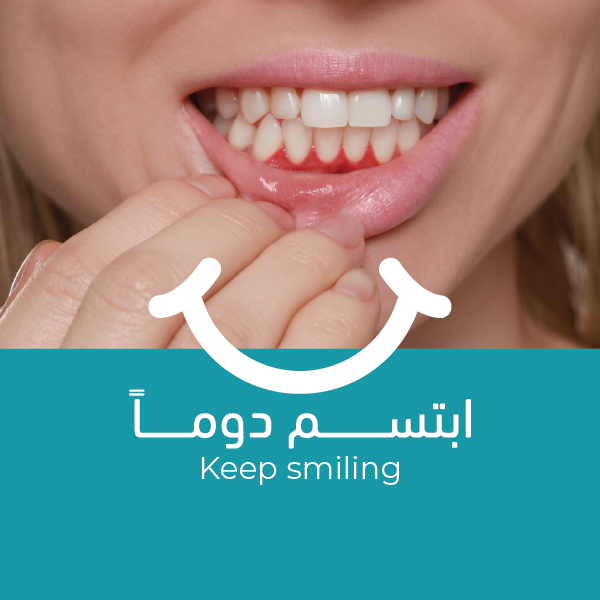
Advanced periodontal treatment
Treatment of advanced periodontal disease: restoring gum health and a radiant smile
Advanced periodontal disease is a common problem that can lead to tooth loss if not treated in a timely manner. Periodontal disease begins with the accumulation of plaque and bacteria around the teeth, which leads to inflammation and regress of the gums. As the condition worsens, it can injure the supporting tissues and bones, which threatens the stability of the teeth. In this article, we will learn about the causes of advanced periodontal disease, its symptoms, and the best treatment methods for restoring oral health.
What is advanced periodontal disease
Advanced periodontal disease is known as periodontitis, which is an inflammatory condition that affects the supporting tissues of the teeth, including the gums and surrounding bones. This condition develops when gingivitis is not treated in its early stages, which leads to permanent damage to the supporting structure of the teeth.
Causes of advanced periodontal disease
- Plaque and tartar build-up: not brushing teeth regularly leads to the accumulation of bacteria that cause gum infections.
- Smoking: increases the risk of gum disease and slows down the healing process after treatment.
- Chronic diseases: such as diabetes and heart disease that may affect gum health.
- Malnutrition: lack of vitamins and minerals necessary for oral health.
- Genetic factors: some people are more susceptible to gum disease due to genetic factors.
Symptoms of advanced periodontal disease
- Bleeding gums when brushing teeth or flossing.
- Redness and swelling of the gums.
- Receding gums and exposing tooth roots.
- Constant bad breath.
- Abnormal movement of teeth or their loss.
- Deep pockets form between the gums and teeth.
Methods of treatment of advanced periodontal disease
Deep cleaning (scaling of roots and scraping of tartar):
It is used to remove tartar and plaque from tooth surfaces and below the gum line to prevent exacerbation of inflammation.
Antibiotic therapy;:
Topical or oral antibiotics may be prescribed to reduce the bacteria that cause inflammation.
Periodontal surgery (reconstructive procedures):
In severe cases, the doctor may resort to surgery to remove deep pockets and reshape the gums.
Gum and bone grafting:
It is used to compensate for tissue and bone loss caused by periodontitis.
Laser treatment of gums:
A modern technique that helps remove injured tissue and stimulate the growth of healthy tissue without the need for conventional surgery.
Prevention of periodontal disease
- Brushing teeth twice a day using a fluoride-containing paste.
- Use dental floss regularly to clean the interdental areas.
- Visit the dentist every 6 months for examinations and professional cleaning.
- Avoid smoking and sugary drinks that are harmful to gum health.
- Follow a healthy diet rich in vitamins and minerals.
Advanced periodontal disease is a challenge for oral health, but with early diagnosis and proper treatment, gum health can be restored and tooth loss prevented. If you experience any symptoms of gum disease, feel free to book an appointment with a dentist for a consultation and effective treatment. Your smile deserves care
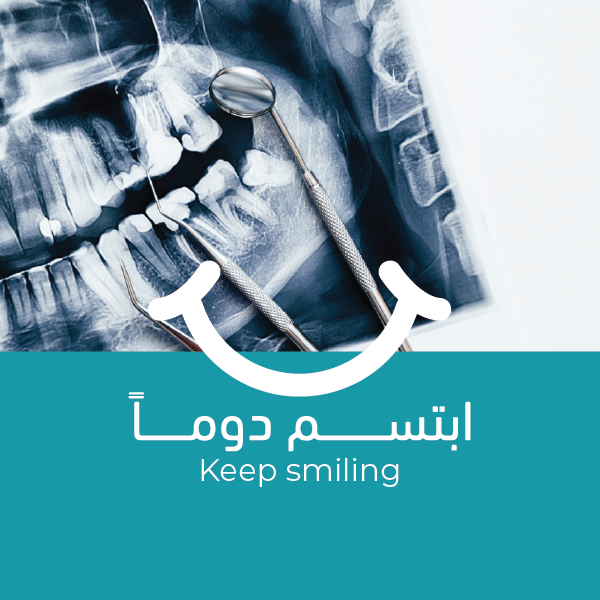
Dental and oral surgeries
Oral and dental surgeries: your comprehensive guide to safe and effective surgical treatment
Oral and dental surgery is an important specialty in dentistry, as it includes a wide range of surgical procedures aimed at treating problems with teeth, jaw and gums. Thanks to advances in surgical techniques and anesthesia, such operations have become more comfortable and safer for patients, which helps them restore oral health and improve the quality of life.
What are oral and dental surgeries
Oral and dental surgeries include a variety of procedures performed to treat complex conditions that cannot be treated with conventional treatments. These surgeries include the removal of damaged teeth, correction of jaw deformities, dental implants, and treatment of acute gum infections.
The main types of oral and dental surgeries
- Surgical tooth extraction: used when the tooth is severely damaged or embedded inside the gum, such as embedded wisdom teeth.
- Dental Implants: a surgical procedure used to replace missing teeth with artificial implants that are fixed in the jawbone, providing a natural appearance and full function of the teeth.
- Jaw correction surgery (maxillofacial surgery): performed to correct occlusal problems and jaw imbalance, which helps in improving oral function and aesthetic appearance.
- Removal of oral cysts and abscesses: procedures aimed at removing benign swellings or deep infections that may affect oral health.
- Gum surgery (gingivoplasty): includes procedures such as gum grafting to treat gingival recession or gum reshaping for a more symmetrical appearance.
When do you need oral and dental surgery
A dentist can recommend oral surgery in the following cases:
- The presence of persistent toothaches due to infections or root problems.
- Difficulty chewing or speaking due to irregular teeth or jaw.
- Loss of teeth and the desire to replace them with dental implants.
- Infections or tumors in the gums need surgical intervention.
Tips for recovery after oral and dental surgeries
- Follow the doctor's instructions: follow the instructions for medication and care after surgery.
- Avoid solid foods: eat soft foods and avoid chewing on the surgical area.
- Maintain oral hygiene: use mouthwash regularly and avoid brushing the severely affected area.
- Adequate rest: avoid stressful activities during the first days after surgery.
Avoid smoking and alcohol: because they affect the healing process and increase the risk of complications.
